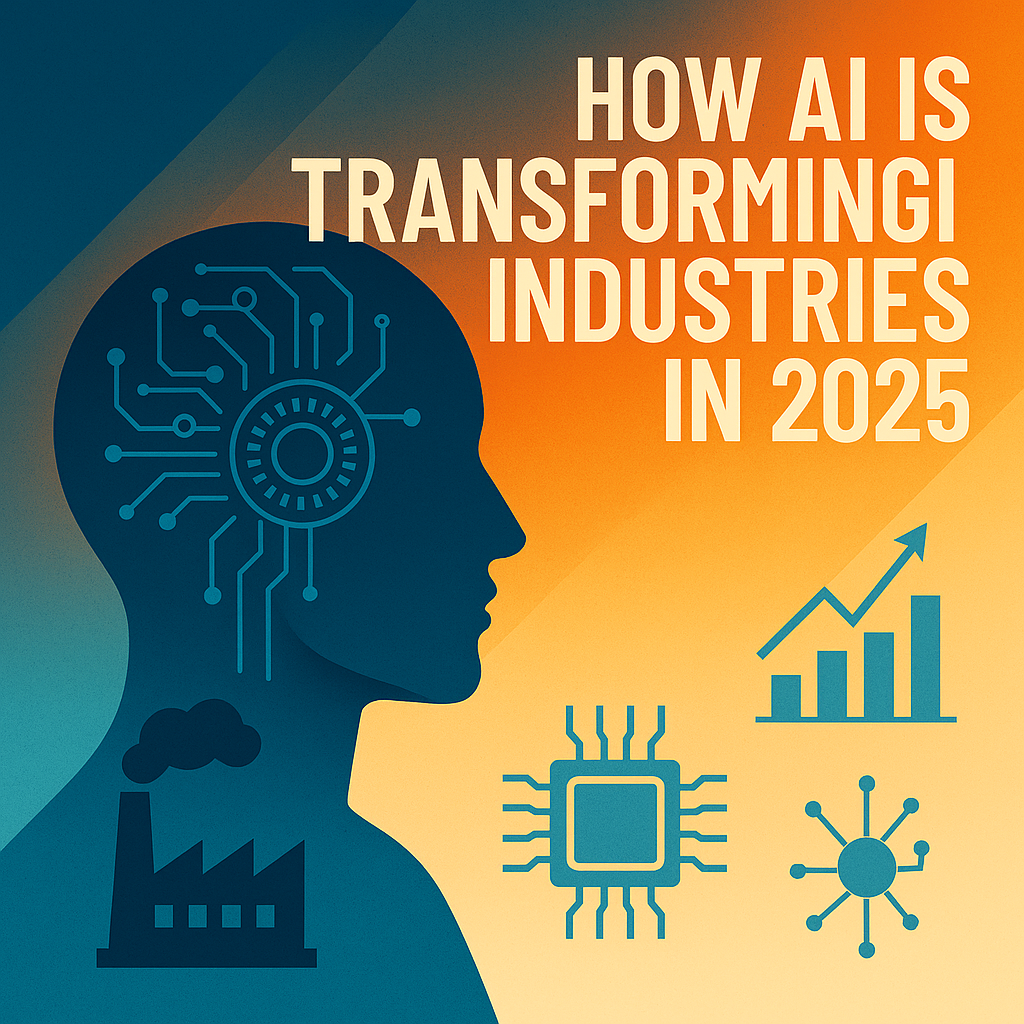
How AI is Transforming Industries in 2025
Introduction
Artificial Intelligence (AI) is no longer a futuristic concept but a practical reality transforming every aspect of modern industry. As we step into 2025, AI is at the core of innovation, reshaping how businesses operate, make decisions, and interact with customers. From healthcare and finance to manufacturing and retail, AI is not just enhancing efficiency—it is redefining the competitive landscape.
In this blog post, we’ll explore how AI is revolutionizing various sectors, the technologies driving this transformation, and the emerging trends and challenges businesses should be aware of in 2025.
1. The Rise of AI in Business Operations
AI-driven automation and intelligent systems have become essential for optimizing business processes. Companies are increasingly deploying AI tools to manage workflows, reduce operational costs, and improve accuracy.
Key Applications:
- Robotic Process Automation (RPA) for repetitive tasks
- Natural Language Processing (NLP) for customer service chatbots
- Predictive analytics for demand forecasting
- AI-powered CRMs for personalized marketing
Benefits:
- Increased productivity
- Real-time decision-making
- Reduced human error
- Enhanced customer experience
2. AI in Healthcare
AI is transforming healthcare by improving diagnostics, patient care, and administrative efficiency. In 2025, we see more hospitals and clinics leveraging AI for predictive diagnostics, robotic surgeries, and virtual health assistants.
Key Innovations:
- AI algorithms for early disease detection
- Personalized treatment plans based on data
- AI-assisted robotic surgeries
- Virtual nurses and AI chatbots for patient engagement
Impact:
- Improved patient outcomes
- Faster diagnosis and treatment
- Cost reduction in healthcare services
3. Financial Services and AI
The finance sector has been one of the early adopters of AI. In 2025, AI is more integrated than ever in areas like fraud detection, algorithmic trading, and personalized financial advice.
AI Use Cases in Finance:
- Real-time fraud detection and risk analysis
- Robo-advisors for investment planning
- Credit scoring using machine learning models
- AI-driven compliance monitoring
Benefits:
- Enhanced security and compliance
- Efficient customer service
- Personalized financial products
4. AI in Manufacturing and Supply Chain
Manufacturing and logistics industries are experiencing a revolution driven by AI. Smart factories, predictive maintenance, and AI-optimized supply chains are becoming the norm.
Technologies Used:
- AI-powered robots and cobots
- Predictive maintenance using IoT and ML
- Supply chain optimization algorithms
- Quality control through computer vision
Results:
- Reduced downtime
- Better inventory management
- Enhanced product quality
- Improved operational efficiency
5. AI in Retail and E-commerce
AI is reshaping the retail landscape by enabling hyper-personalized shopping experiences, efficient inventory management, and intelligent customer interactions.
Notable Applications:
- Recommendation engines for product personalization
- AI chatbots for customer service
- Visual search and smart mirrors in stores
- Demand forecasting and inventory planning
Advantages:
- Increased conversion rates
- Better customer engagement
- Optimized supply chain operations
6. AI in Education
The education sector is leveraging AI for personalized learning, administrative automation, and intelligent content creation.
Key Developments:
- Adaptive learning platforms
- Automated grading systems
- AI tutors for one-on-one learning
- Predictive analytics for student performance
Impact on Education:
- Improved learning outcomes
- Better resource management
- Increased accessibility to quality education
7. AI in Transportation and Automotive
The transportation industry, including automotive and logistics, is being transformed through AI technologies like autonomous vehicles, route optimization, and traffic management.
AI Innovations:
- Self-driving cars and trucks
- AI for traffic flow prediction and optimization
- Predictive maintenance for fleet vehicles
- Smart logistics and delivery systems
Benefits:
- Reduced accidents and traffic congestion
- Cost-effective logistics
- Enhanced passenger safety and comfort
8. AI in Real Estate and Construction
AI is playing a growing role in streamlining real estate transactions, property management, and construction site operations.
Applications:
- AI-powered property valuation tools
- Smart building management systems
- Construction planning and risk analysis
- Virtual tours and customer support via AI
Results:
- Faster decision-making
- Improved tenant experiences
- Enhanced building safety and sustainability
9. Ethical Considerations and Challenges of AI in 2025
Despite its benefits, AI also raises ethical questions and operational challenges that need careful attention.
Key Issues:
- Data privacy and bias in AI algorithms
- Job displacement and workforce reskilling
- Transparent AI decision-making (explainability)
- Regulatory compliance across regions
How Businesses Can Respond:
- Implement ethical AI guidelines
- Invest in employee upskilling
- Adopt AI governance frameworks
10. Future Trends in AI Beyond 2025
As AI matures, new trends are emerging that will further shape industries in the coming years.
Top Trends to Watch:
- AI and quantum computing integration
- Emotion AI and affective computing
- Human-AI collaboration tools
- AI-generated content and creative design
Strategic Recommendations:
- Stay informed about AI innovations
- Foster a culture of agility and experimentation
- Partner with AI solution providers for scalability
Conclusion
Artificial Intelligence is no longer optional for businesses—it’s essential. As 2025 unfolds, organizations across industries are embracing AI to stay competitive, drive innovation, and deliver superior value to their customers. From automating workflows to enhancing decision-making and improving user experiences, AI is transforming how industries operate at every level.
Businesses that proactively integrate AI into their core strategies will be better positioned for sustainable success in the digital age. Whether you’re a startup, SME, or large enterprise, the time to embrace AI is now.
For custom AI solutions and digital transformation strategies, partner with Intellitron Genesis—your trusted technology partner in Mumbai and beyond.

0 comments